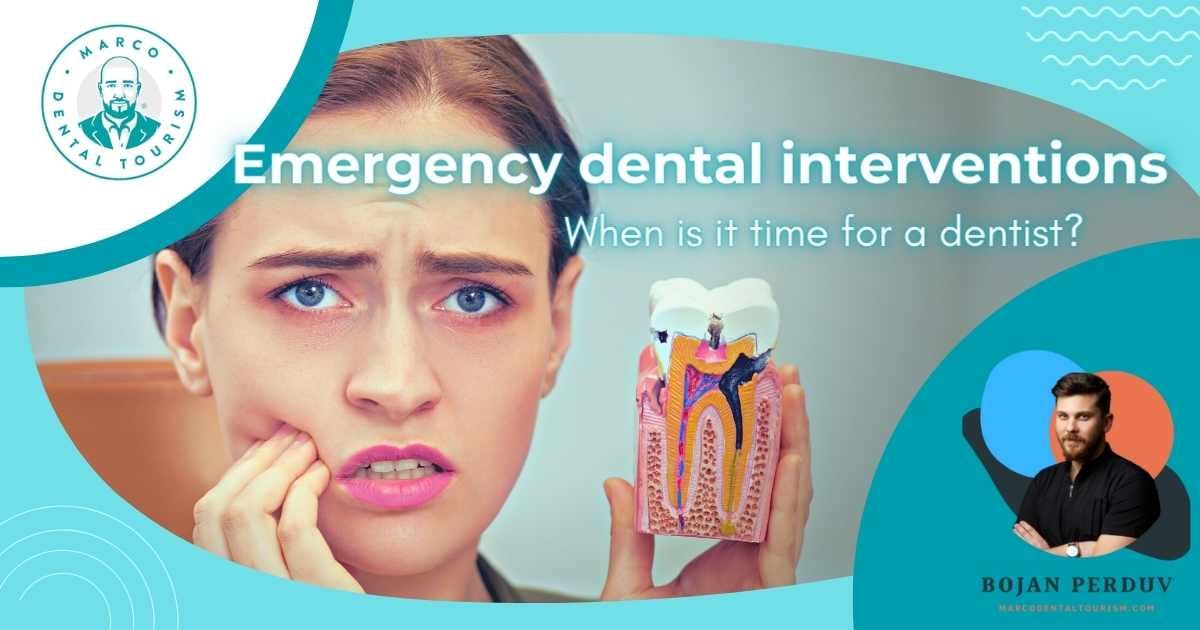Emergency dental interventions: When is it time for a dentist?



In this blog, we deal with emergency interventions, symptoms and signs that indicate that you need emergency dental care. Whether it's a sudden toothache or dental trauma, knowing when to seek emergency dental care can significantly contribute to faster and easier healing.

Emergency dental intervention is any situation that requires immediate help from a dentist in order to relieve pain, stop bleeding and save the tooth. Examples of emergencies include severe toothache, cracked or broken teeth, swollen and bleeding gums, and injuries to the jaw and face.

Emergency dental care is necessary when there is bleeding from the mouth, severe pain that does not go away or injury to the teeth, gums and jaw. Other emergencies may include loose or broken teeth, swollen gums, or a dental abscess. In addition, the sign can be an infection accompanied by swelling and fever.

Signs that indicate the need for emergency dental care include sharp pain, cracked and knocked out teeth, persistent bleeding from the gums, dental abscess, and also swelling of the teeth and face. Other signs may include loose or displaced teeth, difficulty swallowing and breathing, and sudden pain in the jaw.
Whether a dental problem can wait depends on the nature of the problem. If the problem is minor, such as a cracked tooth or a mild toothache, it may be possible to wait for an examination by your chosen dentist. However, if the pain is severe, or if there is bleeding, swelling or signs of infection, it is important to seek emergency care immediately.

Signs of a dental infection include pain, swelling, redness, tenderness, as well as fever, bad breath, and difficulty opening the mouth. See a dentist immediately for diagnosis and treatment to prevent the infection from spreading to other parts of the body.

The most common dental emergencies include toothache, broken or knocked out teeth and gum infection. Other common emergencies include broken fillings or crowns, jaw injuries, and abscesses. In order to receive appropriate treatment, contact your dentist as soon as possible.

If you have a toothache that does not go away for more than two days, you need professional dental intervention. In this way, you will identify the root cause of the pain and prevent all potential complications. In addition, cold compresses, soft food and rest can help relieve toothache at home.
Here are some more suggestions on how to relieve toothache at home:
A dental abscess is a painful infection that can occur in a tooth or in the surrounding gum tissue. Treatment involves draining the abscess and taking antibiotics to kill the bacteria causing the infection. In more severe cases, root canal treatment or tooth extraction may be necessary for complete healing.

If you lose a tooth, it is important to see a dentist as soon as possible. In the meantime, maintain good hygiene, rinse your mouth with salt water, and use cold ice packs to reduce swelling. Avoid chewing on that side and try to keep your mouth completely clean.

To prevent problems that require emergency dental intervention, maintain regular oral hygiene, avoid hard and sticky foods, wear a mouth guard during sports and visit your dentist regularly for a professional examination and cleaning of your teeth.

Regular oral hygiene practices include brushing your teeth twice a day for two minutes, flossing daily, using fluoride toothpaste, and eating a healthy diet. Regular dental checkups and cleanings are also important for detecting and preventing oral health problems.

Dental implants, dentures and bridges prevent urgent dental problems by replacing missing or damaged teeth. In this way, they restore the function and stability of the teeth, reducing the risk of infection, further damage and tooth decay.
It is recommended that you visit the dentist twice a year for regular dental examinations. However, depending on the condition of their teeth, some people may need more frequent dental care. To determine the frequency of examinations for your needs, be sure to consult with your dentist.
When it comes to urgent dental problems, time is of the essence. Ignoring a dental problem can quickly turn a minor problem into a major one, and the longer you wait, the more painful and expensive the solution becomes. That's why in this blog we have resolved all possible dilemmas when you should contact your dentist in order to avoid further complications and so that you can return to your usual daily activities as soon as possible.

Schedule a consultation, and Marco will get back to you as soon as possible!
Share your opinion!
What do you think about this topic?
Comments (0)